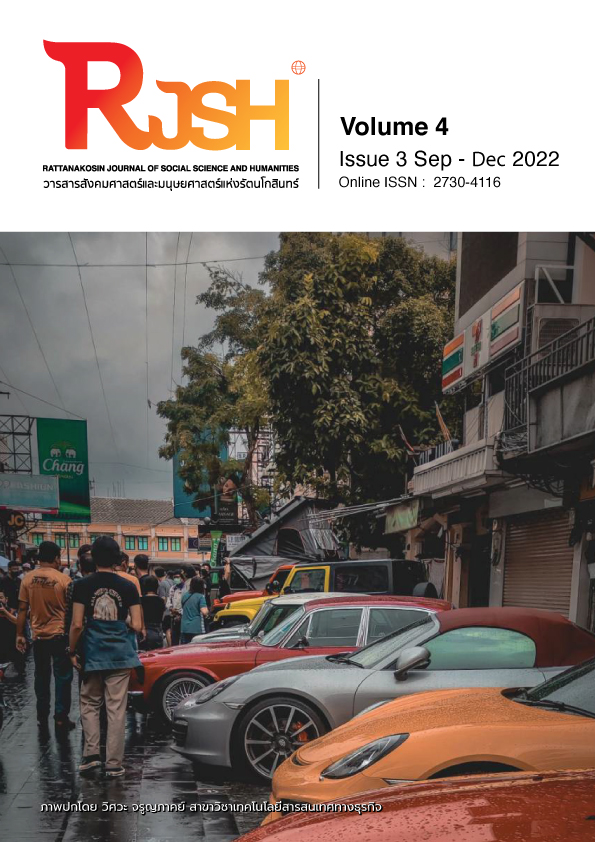Sufficiency Economy Philosophy (SEP) towards Sustainable Development Goals (SDGs)
Main Article Content
Abstract
The United Nations has set goals for world social development: Millennium Development Goals containing 8 issues which ended in 2015. In the 70th annual meeting of the general assembly, the sustainable development agenda of 2030 had been signed which is the development framework of the world. To achieve social development, economy and a sustainable environment, the framework contains 17 goals as follows: (1) No Poverty (2) Zero Hunger (3) Good Health and well-being (4) Quality Education (5) Gender Equality (6) Clean Water and Sanitation (7) Affordable and Clean Energy (8) Decent Work and Economic Growth (9) Industry Innovation and Infrastructure (10) Reduced Inequalities (11) Sustainable Cities and Communities (12) Responsible Consumption and Production (13) Climate Action (14) Life Below Water (15) Life on Land (16) Peace and Justice Strong Institutions (17) Partnerships for the Goals. The sustainable development goal of this United Nations creates alertness in many sectors both internationally and regionally. For Thailand, His Majesty King Bhumibol Adulyadej, The Great, had guided the way of life for people on the path of the Sufficiency Economy Philosophy, modesty reasoning and having good self-immunity under knowledge and moral conditions to make economic, social and environmental conditions develop, balanced and be sustainable forever.
Article Details
The content within the published articles, including images and tables, is copyrighted by Rajamangala University of Technology Rattanakosin. Any use of the article's content, text, ideas, images, or tables for commercial purposes in various formats requires permission from the journal's editorial board.
Rajamangala University of Technology Rattanakosin permits the use and dissemination of article files under the condition that proper attribution to the journal is provided and the content is not used for commercial purposes.
The opinions and views expressed in the articles are solely those of the respective authors and are not associated with Rajamangala University of Technology Rattanakosin or other faculty members in the university. The authors bear full responsibility for the content of their articles, including any errors, and are responsible for the content and editorial review. The editorial board is not responsible for the content or views expressed in the articles.
References
เกษม วัฒนชัย. (2550). เศรษฐกิจพอเพียงตามแนวพระราชดำริ. วารสารผู้ตรวจการแผ่นดินของ รัฐสภา, ปีที่ 5 ฉบับที่ 2 ตุลาคม2549 – มีนาคม 2550: 155-156.
คาร์ล เชกชไนเดอร์. (2545ข). การพัฒนาที่ยั่งยืน: ยาสารพัดนึก? กรณีศึกษาประเทศไทยจากแง่มุมทางวัฒนธรรมต่อการพัฒนาที่ยั่งยืนในเอเชียตะวันออกเฉียงใต้. แปลโดย ธัรพงษ์ ลัพธวรรณ์ และอภิชิต ดวงดี. เชียงใหม่ : มูลนิธิไฮน์ริค เบิลล์ สำนักงานประจำประเทศไทยและภูมิภาคเอเชียตะวันออกฉียงใต้
จิรายุ อิศรางกูร ณ อยุธยา. (2553). ประเทศไทย: ก้าวไปข้างหน้าด้วยการพัฒนาที่สมดุล. กรุงเทพฯ : สถาบันบัณฑิตพัฒนบริหารศาสตร์
จิรายุ อิศรางกูร ณ อยุธยา. (2561). การขับเคลื่อนเศรษฐกิจพอเพียง เศรษฐกิจและสังคม. สืบค้นเมื่อ 20 มีนาคม พ.ศ. 2565 จาก http://www.tsdf.nida.ac.th.
ชนิตา รักษ์พลเมือง. (2557). กระบวนทัศน์พัฒนศึกษา. กรุงเทพฯ : วิญญูชน
ไชยรัตน์ เจริญสินโอฬาร. (2549). วาทกรรมการพัฒนา: อำนาจ ความรู้ ความจริง เอกลักษณ์ และความเป็นอื่น. (พิมพ์ครั้งที่ 4). กรุงเทพฯ : วิภาษา.
ดนัย กิติภรณ์. (2544). ดัชนีชี้วัดการพัฒนาที่ยั่งยืนของประเทศไทย. วิทยานิพนธ์ปริญญามหาบัณฑิต, คณะเศรษฐศาสตร์ มหาวิทยาลัยธรรมศาสตร์.
ประเวศ วะสี. (2542). เศรษฐกิจพอเพียงและประชาสังคม แนวทางพลิกฟื้นเศรษฐกิจสังคม. กรุงเทพฯ : หมอชาวบ้าน
ปัทมาวดี โพชนุกูล ซูซูกิ. (2548). หน่วยที่ 6 การพัฒนาที่ยั่งยืนกับการบริหารจัดการทรัพยากรธรรมชาติและสิ่งแวดล้อม. ในเศรษฐศาสตร์ทรัพยากรธรรมชาติและสิ่งแวดล้อม. นนทบุรี: สำนักพิมพ์มหาวิทยาลัยสุโขทัยธรรมาธิราช.
สุเมธ ตันติเวชกุล. (2549). ปรัชญาเศรษฐกิจพอเพียงพระเจ้าอยู่หัว. กรุงเทพฯ: แสงดาว.
เอก อนันต์. (2550). ปรัชญาเศรษฐกิจพอเพียง Road to Sustainable Economy. กรุงเทพฯ: เม็ดทราย พริ้นติ้ง.
อุดมพร อมรธรรม. (2559). ปรัชญาเศรษฐกิจพอเพียงพระเจ้าอยู่หัว. กรุงเทพฯ : แสงดาว
อำพล เสนาณรงค์. (2550). เศรษฐกิจพอเพียงกับโลกาภิวัฒน์. กรุงเทพฯ : องค์การสงเคราะห์ทหารผ่านศึกในพระบรมราชูปภัมภ์.
Haynes, J. (2008). Development Studies. Malden, Mass: Polity Press.
UN (2021). The sustainable development goals report 2021. Retrieved from https://unstats.
un.org/sdgs/report/2021/The-Sustainable-Development-Goals-Report-2021.pdf


